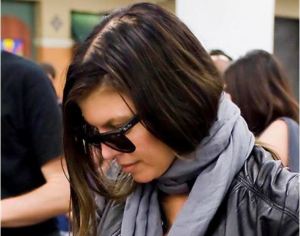Causes of Hair Loss in Women
8 of the most common causes of hair loss in women
Millions of women the world over are finding their hair is thinning out. This can be particularly associated with age, but what else is going on? We look into some of the top causes of hair loss in women.

Causes of Hair Loss in Women:
Over Styling
It’s probably not much of a surprise that heated styling products like straighteners, curling irons and hair dryers can cause hair loss. But did you know that your hairspray, gel or even the type of shampoo you use could also be causing your thinning hair? Be careful not to overuse styling products or opt for natural products. Whilst you’re at it, be careful with your poor head! Simple things like tight ponytails and harsh brushing can also cause hair loss.
Low Iron and B12.
Feeling tired as well as noticing some hair loss? Your problem could be low iron and/or vitamin B12. The good news is that once the proper levels are restored with the help of supplements and/or diet changes, your hair loss may subside. Head to your doctor for a blood test to find out if this is your issue.
Polycystic Ovary Syndrome (PCOS)
Although extra hair growth on the body is common in women with PCOS, in a cruel twist of fate the hormonal imbalances can also be one of the causes of hair loss in women. So, more hair where you don’t want it and less hair where you do. Unfair.
Menopause
As with PCOS, it’s the hormones in menopause that are responsible for this kind of thinning hair. It can help to spend a little extra on natural hair products and take care to keep your hair conditioned. Low oestrogen is also known to make hair dry and therefore more susceptible to breakage. It’s worth noting that your hair may not actually be coming out from the roots but hair breakage could actually be the reason for your thinning hair. Get yourself a microfibre hair towel and be kind to your wet hair since harsh treatment of wet hair can exacerbate breakage. For more information and advice on what to do about hair loss and menopause click here.
 Childbirth
Childbirth
Ok, this is the last one we can blame on our good friend oestrogen! During pregnancy and childbirth, a lot of women will actually experience thicker hair due to the peak in oestrogen levels. This ceases, however, once your baby is born so it is common to experience hair loss after childbirth. Just sit tight, focus on your new bub and your hair should return to normal. For information and advice on what you can do for post partum hair loss click here.
Medication
If you’re taking any regular medications, you may not be in 100% tip top physical condition. Many illnesses or just being unwell can cause hair loss in women, but in some cases it could be the medication itself. It’s important not to overlook any medications you may have been on long term (I’m looking at you, contraceptives) where you have altered your dosage or recently stopped taking them altogether.
Extreme Weight Changes
Putting yourself on a restrictive diet can mean you miss out on some essential nutrients and that can cause hair to thin out. Likewise, gaining a significant amount of weight quickly can also put your body out of whack and mean that your hair once again, can suffer. So stay away from the fad diets if you don’t want to lose more than weight.
Illness
Because hair is viewed by the body as non-essential, it is often the first thing the body stops assigning resources to, meaning it can begin to fall. Hair loss is a common symptom of a lot of illnesses e.g. autoimmune diseases, but what you may be surprised to learn is that hair loss can be caused by acute illnesses like gastro. These short but intense illnesses can put enough temporary stress on the body which can lead to hair loss usually around three months later. The good news is that this type of hair loss can usually right itself without intervention.
What to do next?
Unfortunately for some women, hair loss can become your Achilles heel. For many women one bout of hair loss that rights itself following pregnancy or an illness reoccurs later when the same or another trigger hits.
If you are suffering sudden hair loss ask yourself what you were doing three months ago. Since hair goes through a three month cycle it is often the case that it was three months ago when your body was stressed that the damage was done.
Some of these causes of hair loss in women we have mentioned may have their own solutions (e.g. changing the medications, improving diet, changing hormonal states). But reversing hair loss or improving hair growth can take a long time. While you are waiting however, there is something you can do. There is a new product on the market designed to cover up visible hair loss in women so at least you don’t need to look like you have thinning hair. That solution is BoostnBlend – an instant, easy to apply hair loss concealer designed by women, for women.
You can read more about it here or you can visit the company website below:






I can’t believe that trichotillomania is not listed as another cause of hair loss.
Hi Jenny,
This article was aimed at the less obvious causes however, you raise a good point, we work with and promote Help Me 2 Stop an American Trich association (http://www.helpme2stop.org) and are certainly aware of its existence. We will cover Trich specifically in another article. Thanks!
I developed autoimmune atrophic gastritis and my scalp became covered with thick scale on the back and top. It is so hard, like a turtle shell, that putting oils and even prescription oil on it did little good. They say gently remove the scale, but this is impossible for me, so I soak and remove, etc. It has caused my nails to be broken to the point I can no longer use them to pull or scratch anything. I used a comb, oh so painful, and finally after using multiple shampoos, it started coming off using Psorisis 3% salic acid shampoo and a comb/fingers to remove, plus taking 125mg Fluconizole pill a wk for the past year and a half. This has turned out to be the only thing to start to work. I take a probiotic and other vitamins, estrogen replacement, and neurotin for meds. I truly believe that using the anti-fungal prescription pill once a week has been a turning point for me. My hair had places where it was balding and breaking, now it is looking much better, and my doctor said that she believes it is not effective to treat the outside symptom without treating the inside. Most of the scalp issues that have been studied also include a fungal aspect. This has not been officially decided beyond doubt, but after decades of study, for some reason they have yet to determine why some people get severe dandruff and other scalp issues. This is unacceptable. It surely can’t be that difficult to figure out! Perhaps they need to take it more seriously!